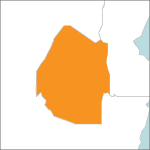 As a result of the 2014 drought triggered by El Niño that left 23 percent of households food insecure, Swaziland needed additional nutrition support to address its nutrition and food-security needs. With funds from the U.S. President’s Emergency Plan for AIDS Relief (PEPFAR), FANTA helped mitigate the drought’s effect by supporting clinical partner Elisabeth Glaser Pediatric AIDS Foundation (EGPAF), which implemented the AIDSFree project in two regions of Swaziland to strengthen the provision and monitoring of nutrition assessment, counseling, and support (NACS) services. The drought’s impact on malnutrition led to an increased need for effective NACS services, including improvement in the identification, treatment, and care of persons with malnutrition and suffering from other related illnesses. FANTA also worked in coordination with World Food Program (WFP), UNICEF, the National Nutrition Council (SNNC), and the Ministry of Health (MOH).
As a result of the 2014 drought triggered by El Niño that left 23 percent of households food insecure, Swaziland needed additional nutrition support to address its nutrition and food-security needs. With funds from the U.S. President’s Emergency Plan for AIDS Relief (PEPFAR), FANTA helped mitigate the drought’s effect by supporting clinical partner Elisabeth Glaser Pediatric AIDS Foundation (EGPAF), which implemented the AIDSFree project in two regions of Swaziland to strengthen the provision and monitoring of nutrition assessment, counseling, and support (NACS) services. The drought’s impact on malnutrition led to an increased need for effective NACS services, including improvement in the identification, treatment, and care of persons with malnutrition and suffering from other related illnesses. FANTA also worked in coordination with World Food Program (WFP), UNICEF, the National Nutrition Council (SNNC), and the Ministry of Health (MOH).
FANTA’s technical assistance to Swaziland included:
- Developing an integrated nutrition training of trainers (TOT) curriculum, which included sessions on NACS, the new Food by Prescription guidelines, and the Integrated Management of Acute Malnutrition (IMAM) guidelines, in consultation with SNNC, MOH, and clinical partners, to harmonize and strengthen provision of nutrition services.
- Conducting two TOTs with implementing partners for 57 clinical mentors from EGPAF, ICAP, University Research Corp. and representatives from SNNC, MOH, WFP, and UNICEF.
- Developing a curriculum for cascade trainings to be undertaken by the clinical mentors.
- Procuring and disseminating 800 body mass index wheels to support assessment of nutritional status in health facilities around the country.
- Providing NACS counseling materials to the SNNC to address the need for facility-level job aids in support of effective nutrition counseling.
- Assisting EGPAF to integrate NACS activities into its quality improvement activities.
- Conducting an assessment and drafting a report on the nutrition information that is collected through the country’s Health Management Information System/Central Management Information System to help inform and build the government’s capacity to improve nutrition service provision.


